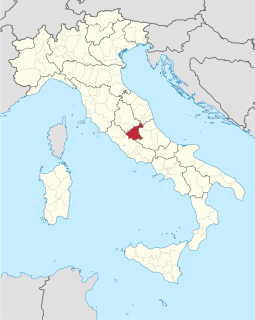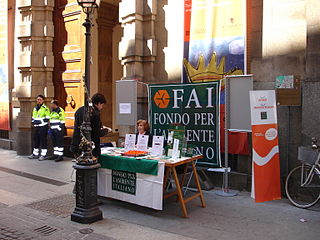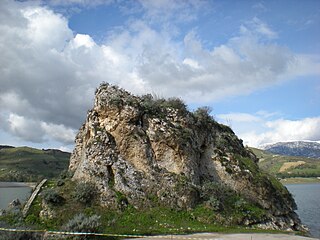
The Province of Grosseto is a province in the Tuscany region of Italy. Its capital is the city of Grosseto. As of 2013 the province had a total population of 225,098 people.

Lecco is a city of 48,131 inhabitants in Lombardy, northern Italy, 50 kilometres (31 mi) north of Milan, the capital of the province of Lecco. It lies at the end of the south-eastern branch of Lake Como. The Bergamo Alps rise to the north and east, cut through by the Valsassina of which Lecco marks the southern end.

Trasimène[tʁa.si.mɛn] was a department of the First French Empire from 1809-1814 in present-day Italy. It was named after Lake Trasimeno. It was formed on 15 July 1809, when the Papal States were annexed by France. Its capital was Spoleto.

The Province of Rieti is a province in the Lazio region of Italy. Its capital is the city of Rieti. Established in 1927, it has an area of 2,750.52 square kilometres (1,061.98 sq mi) with a total population of 157,887 people as of 2017. There are 73 comuni in the province.

The Fondo Ambiente Italiano (FAI) is the National Trust of Italy.

Alessandria della Rocca is a comune and small agricultural town located in the northern part of the Province of Agrigento, west central Sicily, southern Italy.

Malcesine is a comune (municipality) on the eastern shore of Lake Garda in the Province of Verona in the Italian region Veneto, located about 120 kilometres northwest of Venice and about 40 kilometres northwest of Verona.

Spinone al Lago is a comune (municipality) in the Province of Bergamo in the Italian region of Lombardy, located about 70 kilometres (43 mi) northeast of Milan and about 20 kilometres (12 mi) northeast of Bergamo, on the left bank of the Lake Endine.

Niccolò Circignani was an Italian painter of the late-Renaissance or Mannerist period.

The Castelli di Cannero are three rocky islets of Lake Maggiore in northern Italy. They are located off the shoreline of Cannero Riviera while administratively forming part of the Comune of Cannobio. They are known as castelli, or castles, in recognition of the ruined ancient fortifications which are found on two of them. They are all that remains of the Rocca Vitaliana fortress built between 1519 and 1521 by Ludovico Borromeo, who gave it this name in honour of an illustrious ancestor.

Guido Ubaldo Abbatini (1600–1656) was an Italian painter of the Baroque period, active mainly in Rome and Usigni.

The Loggia del Mercato Nuovo, popularly known as the Loggia del Porcellino, is a building in Florence, Italy. It is so called to distinguish it from the Mercato vecchio that used to be located in the area of today's Piazza della Repubblica.

Castello Orsini-Odescalchi is a castle in Bracciano, in the Province of Rome, Lazio, Italy. It is located on the southern shore of Lake Bracciano. It was built in the 15th century, and combines the functions of a military defence structure and a civilian residence of the feudal lords of the period, the Orsini and Borgia, both papal families. As one of the largest and best-maintained castles in Italy, it also houses a museum; as a centre of cultural events, the Castello has hosted several high-profile weddings like the ones of Tom Cruise/Katie Holmes, Eros Ramazzotti/Michelle Hunziker, and Petra Ecclestone/James Stunt.
Nando Tamberlani (1896–1967) was an Italian film actor. A character actor in Italian cinema of the postwar era, he was the brother of actor Carlo Tamberlani. Another brother Ermete Tamberlani was also an actor. He appeared in a number of peplum epics during the late 1950s and 1960s.

The Castello della Pietra d'Amico was a 14th-century castle in Alessandria della Rocca, Sicily, southern Italy. Today, very little remains of the structure, since part of the rock on which it was built collapsed.

Matteo Castelli was a Swiss architect. His nephew Costante Tencalla also became an architect.
















